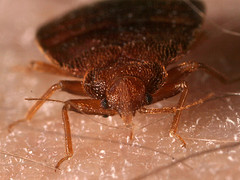
flic.kr/p/81RWoQ
Long before notorious bloodsuckers like Dracula and his vampire bat kin haunted people’s dreams, a small, lesser-known creature was making a bloodthirsty feast of bedtime. Those devils, the bed bugs, continue to prey on innocent victims to this day.
Scientifically known as Cimex lectularius, bed bugs are tiny pests that feast at night on the blood of humans and other mammals. In daytime, bed bugs typically locate themselves in the very places where people sleep. Their tiny bodies are able to fit in the narrowest of spaces, including head boards, mattresses and box springs. Unlike social insects like bees and ants, bed bugs do not congregate in a single area.
Human beings have always dealt with the problem of bed bugs. These ancient struggles have been recorded in writings about medieval Europe and classical Greece even during the time of Aristotle. Including human victims, bed bugs were also known to feast on wild hosts including birds and bats.
The problems associated with bed bugs became widespread prior to WWII, when there was little focus on personal cleanliness and proper hygiene. With the use of various pesticides throughout the 1940s and 1950s, the bugs all but disappeared. A greater understanding of the risks associated with pesticide use, however, has created a reform in the acceptable chemicals used in pest control. The bed bugs, as a result, are once again finding their unwelcome place in society.
Big Bugs
An adult bed bug is often mistaken as a cockroach or tick. In maturity, bed bugs are approximately ¼ inch in length with hard, flat, oval-shaped bodies. These insects can move swiftly over floors, ceilings, walls and other surfaces. They have no wing, and not able to fly. Female bed bugs can lay as many as 500 eggs during their lifespan and choose secluded spots to nest. When the eggs hatch, the baby bugs or nymphs will fully develop in approximately one month. In cooler locations, or places without blood to feed, the maturity time will be prolonged. Nymphs can live for several months without feeding, while the adults can live for around a year.
Bite Me
Humans in deep sleep are primary targets of bed bugs. It is probable that you may not even notice that you are being bitten, as the entire feeding process can take as little as one to three minutes. Usually, bed bug victims won’t even know that they were bitten until itchy bumps or welts appear a day or two later.
Persons that travel frequently, sleep in used beds or do not regularly clean their beds may be prone to bed bug infestation. While it’s believed that these pests do not pose a danger of serious disease, there may complications from bed bug bites. If you have experienced such bits, use antibiotic cream or apply an antiseptic to the infected portion of the body. The bites will be itchy, but try hard not to scratch. This just worsens the infection.
Bug Out
Bed bugs are nothing fresh. They’ve been causing problems for many centuries, and a fast and easy solution has yet to be developed. Your best course of action in the battle against bed bugs is to hire a pest control professional. Those with experience in this industry will know where the bugs inhabit. They’ll know where to look for the tiny buggers, and how to get rid of them. You can help make their jobs a bit easier by cleaning away excess clutter in the area. The inspectors should check each room, as bed bugs travel to other areas of the home.
Get a New Bed
It may be necessary, as a last resort, to throw the bed. The bed frame and mattress are the main breeding ground for these insects. Any tears or holes in the mattress, or even the tiniest crevice in the frame, likely contain bed bug eggs. If your bed is in poor shape or heavily infested, the pest control company may advise you to replace it.
Bed bugs aren’t choosy about where they settle. Any area with a warm body will do. Bed bugs can be found in foam pads, sleeping bags and even stacks of cardboard on the floor. Any place where people sleep is the perfect feeding, living and breeding environment for bed bugs. Waterbeds, with their warm temperatures and many corners and crannies, are the perfect spot for bed bugs to thrive.
Despite the measures that we have for dealing with bed bugs, it looks like that these pests are here to stay. Your best defense is to practice common sense about your cleanliness and personal hygiene within your home. If you suspect that you may have bed bugs, call a professional exterminator urgently to take care of the problem before it becomes a full-blown infestation.
Tagged with: bed bugs control • pests control
Filed under: Bed Bugs